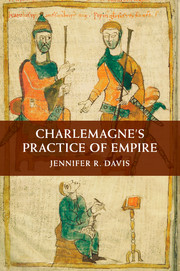‘Historians have rightly emphasized the importance of religion to Charlemagne and his contemporaries. In this refreshingly original, lucid and strongly argued book, Jennifer R. Davis shows that ideology is only part of the story. Finding what worked empirically was what drove Charlemagne’s practice of empire, and produced some enduring effects.'
Janet Nelson - King’s College London
'Jennifer R. Davis' study fundamentally revises older romantic images of Charlemagne's empire as a short period of a Renaissance of central authority and imperial unity. Exploring its formation as the result of an experimental process that was much more shaped by practical reason than by ideology, by pragmatic flexibility, and by fuzzy conceptions than by the implementation of an imperial master plan, Davis provides us with a fresh look at the formation of a new imperial culture, which shaped European politics for many centuries to come.'
Helmut Reimitz - Princeton University, New Jersey
‘Davis has written not yet another Charlemagne biography, but rather an audacious reassessment of his reign as a crucial episode in the history of European rulership and governance. Deeply learned, meticulously researched, and subtly argued, it is a model for how to write pre-modern political and institutional history in the twenty-first century.’
Adam J. Kosto - Columbia University, New York
'With this prodigious study, Jennifer R. Davis has announced herself as an important scholar of Carolingian politics.'
Hans Hummer
Source: German History
'This book has already established itself as essential reading for specialists of the period and for all historians concerned with the question of empire and pre-modern states. It manages to combine the study of institutions of government with that of networks of power, too often seen as contradictory. It suggests approaching the great sovereigns in terms of their concrete actions, leaving aside for the moment how they were represented. The results are convincing and even astonishing, because even if the author did not set out to write a biography, by the end of the book, the reader is left with an original impression of the personality of Charlemagne.'
Martin Gravel
Source: Revue historique
‘In some ways this is a radical book … But while the arguments are bold, the underlying scholarship is sound and thorough … [Jennifer R. Davis] has written an important book brimming with new ideas and suggestions for further research.’
C. M. A. West
Source: The English Historical Review
‘This book has much to offer scholars of the early Middle Ages. Davis gleans as much from of the sources as possible, but rather than force the evidence into a particular vision or framework of empire, she’s able to elucidate both the specific political practices and broader outlines of Charlemagne’s rulership. Additionally, she is able to address the extensive body of scholarship on Charlemagne’s reign, balancing older, still relevant works, such as that of the eminent François-Louis Ganshof, with more recent studies of Charlemagne’s reign. This is an important contribution to the still-growing body of work on early medieval politics and Carolingian kingship.’
Jace Stuckey
Source: Speculum
‘Jennifer Davis’s new book combines the traditional and the new in intriguing and productive ways … an important and distinctive view of Charlemagne and his rule … Davis’s study encourages us all to think substantially harder about what exactly Charlemagne was trying to do, the methods he used and both his successes and failures.’
Rachel Stone
Source: Early Medieval Europe
'Charlemagne's Practice of Empire is a challenging read - the type that forces the reader to immediately think about how to react to it. It is as provocative as it is profound, and which will hopefully become a standard work of reference for the years to come, inspiring students and more advanced scholars alike.'
Rutger Kramer
Source: Sehepunkte
'This is material with which Davis is intimately familiar, and her command of the subtleties of these texts and their manuscript traditions comes through clearly throughout the volume … Whether one accepts some or all of Davis’ conclusions, her study is now essential reading for all specialists working on early medieval Europe. Essential.'
David S. Bachrach
Source: H-France Review



